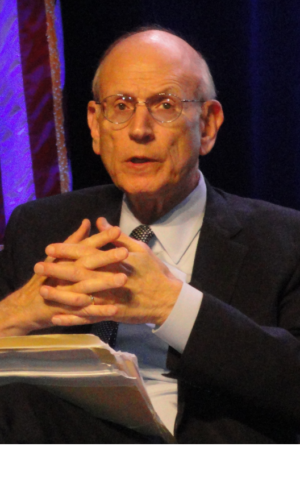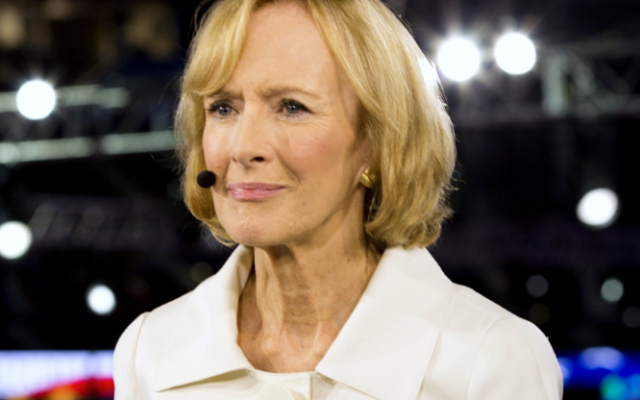PBS Anchor Sees Threat to Press Freedom
Eizenstat lecture series to feature veteran journalist Judy Woodruff
The Eizenstat Family Memorial Lecture Series at Ahavath Achim Synagogue Dec. 15 features broadcast journalist Judy Woodruff, the anchor and managing editor of the PBS NewsHour. She’ll be interviewed by Stuart Eizenstat, who has underwritten the prestigious series for the past 32 years. Woodruff will be speaking on “The Free Press in Our Polarized World.”
During a long career that spans five decades, Woodruff has worked at CNN and NBC News as well the public broadcasting’s flagship news broadcast. She’s been a strong advocate for a free press and has served on the boards of such organizations as the Carnegie Corporation and the John S. Knight Journalism Fellowships at Stanford University.
She is a member of the Council on Foreign Relations and the American Academy of Arts and Sciences. Woodruff began her career as a news anchor at WAGA-TV in Atlanta. The Georgia Association of Broadcasters made her a member of their Hall of Fame.

We caught up with her recently in Washington, where she was preparing for another day’s broadcast of the PBS NewsHour.
AJT: What do you see as the greatest threat to press freedom today?
Woodruff: I think the greatest threat right now is the lack of belief in the importance of a free press, and to be even more specific to the lack of belief on the part of so many Americans that the press can be trusted. I am concerned about the level to which we have sunk in this country, where journalists are being characterized as enemies of the American people and being characterized as being all about fake news, making things up, reporting information that people can’t rely on, can’t trust. That is not going to be very easy to peel away. And I’m not saying we’re perfect. But I mean, for me, the true picture is very different from what so many Americans want to see.
AJT: What do you think we’ve learned about the threat to freedom of the press in this election we’ve just gone through?
Woodruff: That’s a big question. I would say that that people are willing to believe that much of the press has an agenda. I don’t believe that’s true of the traditional media in this country, the so-called mainstream media. And that’s now become a pejorative. It used to be a badge of honor if you work for the mainstream media, if you work for one of the major news organizations that have been with us for decades, if not hundreds of years or more. But that’s all my wind-up way of saying that the mainstream media has now been targeted, tarnished with this label of not to be trusted, not to be believed. And I think we’ve learned how, again, those attitudes can be hardened in the heat of a campaign.
AJT: In recent years there’s been a question of whether social media should be considered a part of a free press or an enemy of a free press. Some have argued that social media creates division in society and monetizes that division, that social media profits from dividing people into one side or the other. What’s your view of this?
Woodruff: I think it’s a complicated question that we’re still figuring out. First of all, social media is not a journalistic entity. It’s a vehicle for conveying opinion, information, news stories, family pictures, gossip, rumors and everything in between from conspiracy theories all the way to news bulletins. I mean, it’s everything from the most credible to the least credible. But by and large, these are vehicles that were created with a very different goal in mind. And so I think we’re still figuring it out.

AJT: Given the contentious world that we live in, the polarized political world that we live in, do you anticipate that there will be more legal oversight of social media?
Woodruff: I think watching what happens in Congress certainly leads you to believe there are going to be efforts to do that. You certainly see the strong interest in both political parties for different reasons, for imposing more controls on social media. Clearly, it’s a subject of greater and greater interest in the Congress, in any administration, Republican or Democrat. And so I think you have to keep your eye on that one.
- Judy Woodruff
- Eizenstat Family Memorial Lecture
- Ahavath Achim Synagogue
- Press Freedom
- social media
- Bob Bahr
- Eizenstat Family Memorial Lecture Series
- Education
- Stuart Eizenstat
- NBC News
- Carnegie Corporation
- John S. Knight Journalism Fellowships
- Stanford University
- Council on Foreign Relations and the American Academy of Arts and Sciences
- The Georgia Association of Broadcasters
- WAGA-TV
- Atlanta
- PBS NewsHour
- Election
- Political
- politics



comments